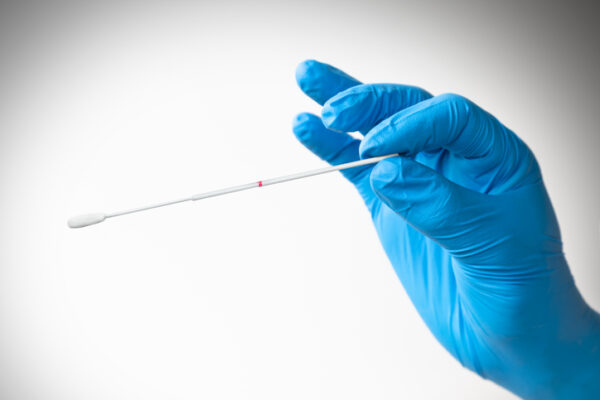
Cough, fever, and breathing difficulty could signal a Covid-19 infection. It could also be the flu. A Lucira Health diagnostic is now the first one authorized by the FDA to identify the culprit virus in a single test, yielding results in about 30 minutes. But the regulatory decision for the diagnostic did not come fast enough for Lucira.
Two days before the FDA’s Friday announcement of Lucira’s new emergency use authorization (EUA), the company disclosed it had filed for bankruptcy protection, a move it attributed in part to the regulator.
In 2020, Emeryville, California-based Lucira was the first company awarded emergency authorization for an at-home Covid-19 test. That regulatory decision sparked rapid company growth to meet surging test demand. In early 2021, the company was able to raise nearly $160 million in an upsized IPO. A new Lucira diagnostic for both Covid-19 and flu followed, and the company proceeded to manufacture it in anticipation of future consumer demand.
Both of the company’s tests won CE Marks in Europe last May. That same month, Lucira submitted its FDA application seeking authorization for the combination product for prescription, at-home use of the test. The company said in the bankruptcy announcement that it expected an FDA decision by August. While the test went on to receive regulatory authorizations in Canada and New Zealand, it still awaited an FDA decision.
In November, the FDA recommended proceeding with a review of the combination test for point-of-care use, Lucira said in its third quarter 2022 financial report. The FDA agreed to allow the company to amend the authorization to include over-the-counter use after the company produced more data from clinical trials. The company noted in the report that the delay in receiving an EUA limited its ability to generate revenue during the flu season. Meanwhile, pandemic restrictions that were lifted throughout last year further weakened testing demand. In the third quarter of last year, Lucira recorded a $107.2 million charge due to excess inventory and non-cancellable purchase commitments to the contract manufacturer of the tests.
Last October, Lucira laid off 25% of its staff in a corporate restructuring and began exploring strategic alternatives that included a potential sale of the company. In December, the Nasdaq sent Lucira a delisting notice due to its ailing stock price. In the bankruptcy announcement, Lucira President and CEO Erik Engelson noted the toll taken on the company by weaker testing demand.
“This, combined with slower than anticipated regulatory approval for the new combined test kit developed for the 2022-2023 flu season led to insufficient revenue and capitalization to offset expenditures,” he said. “Despite every effort to reduce capital outlays and restructure our business, we took this action to protect and maximize the value of our assets.”
Lucira said it expects to continue operating during the Chapter 11 process and is seeking to complete an expedited sale process with bankruptcy court approval.
Emergency authorizations for new Covid-19 diagnostics are becoming rarer. Last September, the FDA announced it would consider fewer emergency authorization requests. It said the large number of new tests that had become available provide sufficient testing capacity, so diagnostics developers should direct new submissions to traditional regulatory review pathways. Exceptions to that directive include EUA requests that were already submitted and pending review, such as Lucira’s new test.
Lucira’s single-use Covid-19 and flu diagnostic analyzes a nasal swab sample that’s swirled in a vial that is then placed in the test unit. The diagnostic produces results in 30 minutes or less. According to the FDA, clinical trial results showed the Lucira diagnostic correctly identified 99.3% of negative and 90.1% of positive influenza A samples from people with symptoms. In Covid-19, the diagnostic correctly identified 100% of negative samples and 88.3% of positive samples. The Lucira test was able to detect 99.9% of negative influenza B samples, but this strain is rarer than influenza A. The FDA said that there were not enough influenza B cases to include in a clinical study; the authorization requires Lucira to continue to collect samples to assess the test’s ability to detect influenza B in the real world.
The FDA made no acknowledgement of Lucira’s bankruptcy filing. In Friday’s announcement, Jeff Shuren, director of the agency’s Center for Devices and Radiological Health, called the new authorization a milestone in expanding consumer access to diagnostic tests.
“The FDA strongly supports innovation in test development, and we are eager to continue advancing greater access to at-home infectious disease testing to best support public health needs,” Shuren said. “We remain committed to working with test developers to support the shared goal of getting more accurate and reliable tests to Americans who need them.”
Shares of Lucira closed Friday at 14 cents each.
Photo: Jmsilva, Getty Images










